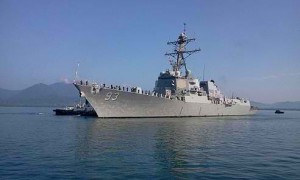By TESSA JAMANDRE
INTERNATIONAL law and constitutional law experts are set to ask the Supreme Court on Wednesday to nullify the three-week-old Archipelagic Baselines Law, barely a month before the May 13 deadline for the Philippine government to submit to the United Nations its claim over its extended continental shelf under the UN Convention on the Law of the Sea.
Saying Repubic Act No. 9522 “dismembers a portion of the territory of the Philippines, in violation of the Constitution,” University of the Philippines law professors Merlin Magallona and Harry Roque, their students in constitutional law and public international law, and Anakbayan party-list Rep. Risa Hontiveros will also ask the High Tribunal to stop the government from registering and depositing with the UN Secretary General a copy of the law signed by President Arroyo on March 10.
The petitioners said the government should be prevented from depositing the law with the UN because, once deposited, “it becomes immediately binding on the Philippines under international law, and its subsequent constitutional invalidation by (the Supreme Court) cannot anymore undo the irreparable harm.” (Download a copy of the anti-RA 9522 petition.)
R.A. 9522 redrew the country’s baselines to comply with the UNCLOS requirements for an “archipelagic state,” in the process excluding the disputed Kalayaan Island Group (KIG) and Scarborough Shoal from the main archipelago and classifying them instead of “regimes of islands.” The limits of Philippine territory defined in the law will determine the country’s extended continental shelf, which is believed to contain substantial amounts of oil, natural gas, minerals and polymetals.
The 70-page petition to be filed in the Supreme Court named Executive Secretary Eduardo Ermita, Foreign Affairs Secretary Alberto Romulo, Budget Secretary Rolando Andaya, National Mapping and Resource Information Authority Administrator Diony Ventura and Philippine Permanent Representative to the UN, Ambassador Hilario Davide Jr., as respondents. Davide is supposed to deposit R.A. 9522 and the country’s claim over its extended continental shelf with the UN.
The Department of Foreign Affairs’ Center for Maritime and Ocean Affairs (CMOA) has not responded to VERA Files’ request for a comment.
Historical, legal, scientific bases
Magallona, Roque, Hontiveros and their co-petitioners said the new law deprives the country of what has been established in historical, legal and scientific terms as part and parcel of its national territory.
The petitioners cited, among others, the controversial 1898 Treaty of Paris which, they said, delineated “a well-defined area of national territory” of the Philippines when it was ceded by Spain to the United States.
They added that the 1900 Treaty of Washington between Spain and the United States included Cagayan, Sulu and Sibutu in Philippine territory, while the 1930 convention between Great Britain and the United States defined the boundary between the Philippines and Northern Borneo.
A mere statutory act—R.A. 9522 in this case—cannot remake a constitutional definition of the national territory, provided in the 1935, 1973 and 1987 Constitutions, according to the petitioners.
Roque also said the scope and breadth of the country’s territory predated the UNCLOS. “How dare Mrs. Arroyo give away this territory to the detriment of the Filipino people,” he said.
The petitioners argued that the UNCLOS does not compel the Philippines to categorize itself as an archipelagic state or to draw the baselines for such a state on or before May 13 this year. The May 13 deadline pertains only to the submission of the extended continental shelf which, they said, can be drawn from the established baselines.
An archipelagic state under the UNCLOS makes use of the straight baselines method to delineate the national territory. This entails drawing straight lines connecting the outermost points of the outermost islands following the general contour of the archipelago.
The petitioners said, however, R.A. 9522 “radically revised” the definition of the Philippine archipelago under the Treaty of Paris. “The result is a roughly triangular delineation which excludes large areas of waters within the 600 miles by 1,200 miles rectangle enclosing the ‘Philippine archipelago’ as defined in the Treaty of Paris,” they said.
“Hence, R.A. 9522 constitutes a drastic reduction of Philippine territory and a treasonous surrender of Philippine sovereignty, which is incomprehensible given that the Treaty of Paris has been consistently incorporated in all of our organic charters from the 1935 Constitution up to the present 1987 Constitution,” the petitioners said.
Claim over Kalayaan, Sabah weakened
Magallona, an expert on the UNCLOS who has argued before the International Court of Justice twice, was quoted in the petition as saying that by declaring the KIG and Scarborough Shoal as regimes of islands, the country has lost 15,000 square nautical miles of territorial waters. Under UNCLOS, a regime of islands consists of islands or naturally formed areas of land surrounded by water that remain above water during high tide.
“By surrendering the above-mentioned territorial waters through the passage of R.A. 9522 excluding the KIG and Scarborough Shoal from the baseline, the State has reneged on its constitutional duty to protect our exclusive marine wealth and the offshore fishing grounds of our subsistence fishermen,” the petitioners said.
R.A. 9522 weakened the country’s claim not only over KIG but also over Sabah, they added.
The KIG is part of the disputed Spratlys chain of islands in the South China Sea being claimed in part by the Philippines, Malaysia, Taiwan and Brunei and in whole by Vietnam and China. The Philippines officially staked its claim over the KIG in 1978 through President Decree 1596, which declared it a distinct and separate town of Palawan.
The passage of R.A. 9522 has been the subject of diplomatic protests from China and also prompted the Chinese to send patrols to the disputed area last month.
The Philippines and Malaysia, meanwhile, have conflicting claims over Sabah in northern Borneo. The Sultan of Brunei ceded Sabah to the Sultanate of Sulu, which in turn leased it to the British North Borneo Company in 1878. The Malaysian claim is based on a perpetual lease. The Philippines formally asserted that Sabah was part of its territory in 1962 based on the claims of the heirs of the Sultanate of Sulu, who had ceded proprietary rights over Sabah to the Philippines. The Sabah issue has been shelved for the sake of peaceful co-existence between the two countries.
Internal waters
The petitioners said R.A. 9522 was also unconstitutional because it converted the country’s internal waters into archipelagic waters. This means that the waters inside the baselines between islands are no longer internal waters over which the Philippines has full and exclusive sovereignty.
In effect, the law gave foreign vessels the right to innocent passage over the Philippine internal waters and, worse, the right of the aircraft of other states to make overflights in Philippine airspace in violation of the Constitution, according to the petitioners.
“Since the Philippines will have to allow foreign ships of all kinds to navigate in Philippine waters—including nuclear-powered submarines, nuclear-powered warships and other ships carrying weapons-grade nuclear substances, this clearly violates our Constitution’s nuclear-weapons free policy,” they said.
The petitioners also recalled that when the Philippines signed the UNCLOS on Dec. 10, 1982, it explicitly expressed that “the convention shall not be construed as amending in any manner any pertinent laws and presidential decrees or proclamations of the Republic of the Philippines.” The government declared at the time that it was maintaining and reserving its “right and authority” to amend these according to the Philippine Constitution.
“R.A. 9522 forever closes the door to any Philippine efforts to obtain the acceptance by the international community of our constitutionally-defined national territory,” the petition said. “R.A. 9522 abandons, or at the very least, severely weakens, any and all claims we have or may have over territories as defined by our Constitution.”
Magallona, Roque, Hontiveros and their co-petitioners described their petition against the baselines law as among the most important cases to be decided by the Supreme Court.
“What is at stake is national territory and resources which is the only hope for the Filipinos to recover from the quagmire brought about by corruption and misfeasance of government. It goes into the very identity of the Filipino people insofar as territory is an element of statehood,” Roque said.

